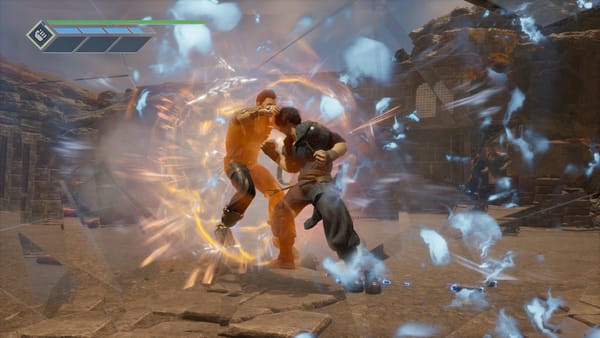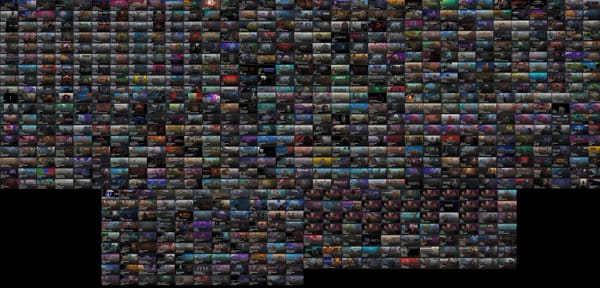#146: Cell damage
On a terrible week for games media, and my fears for the future of the profession.
[Hello! If you’re reading this in a browser window you should know it’s an email newsletter, and you can get it in your inbox a couple of times a week for free by signing up here.]
This has been a brutal week for the games media. First, word emerged that Future had laid off an unspecified number of staff at Techradar Gaming, Android Central and iMore. On Wednesday, Comcast let go 20 to 30 staff at G4TV. And yesterday, the Tencent-owned Fanbyte conducted a very public, and very messy, gutting of its core editorial team. Among those affected are the site’s editor in chief, head of media, and news editor — the last of whom was asleep on the other side of the world, after a busy day covering the Tokyo Game Show, when the dismissal email came in. Fuck about.
I do not know the precise reasoning behind any of these dismissals, but I feel pretty confident in saying that there isn’t one, really. Somewhere a cell on a spreadsheet has changed from a seven to a four, from green to amber, and the panic button has been hurriedly struck. There has been boardroom chatter about efficiencies, about restructuring, about restrategising, which probably isn’t a word but they all say anyway. Sure, Comcast made more than $30bn last quarter. Yes, Future grew revenue by almost 50% in the first half of its current fiscal year. And yeah, sure, Tencent makes more than $80bn a year and spends money like it is going out of fashion. But look. Look at that one cell, there. It’s changed colour.
I’ve heard plenty from website editors over the last few months about how rough this summer has been for traffic. There has been precious little worth writing about, with no big games coming out and not-E3 causing barely a ripple. Summer is usually a quiet time in the game industry, but it has been especially so this year, and likely looks even worse to the corporate bean-counters when placed in the context of a very strong start to 2022 and, before that, the surge in interest in games when lockdowns struck. But this is only a temporary downturn, and had to happen at some point. It is an awfully short-sighted management team that fails to recognise what seems to me to be a fairly obvious fact.
That said, it is hard to overstate just how little the people at the top of these companies really understand the things they make and sell, the specifics of the markets they operate in, or the realities of things on the shop floor. Back in my Edge days I would occasionally be summoned to a meeting with senior management to talk about my plans for the next six months of the magazine. I rarely had anything to say. The future is pretty hard to predict in a medium as dynamic as games. What’s the point in trying to line up a cover for July in January, when I have no idea what’s going to happen at GDC or E3? What if a new console gets announced but I’ve already committed to putting a Ubisoft game on the cover? Besides, I owed it to readers to make Edge feel as up-to-date as possible. It was already hard enough keeping pace with the online bods, and if we tried to turn our six-week lead times into six-month ones, we’d be on a hiding to nothing.
I remember one of the suits taking me to task over this. He said that proper planning was critical, and as an example of how it should be done, he referred to All About History magazine. Whenever its editor came to a planning meeting, apparently, they would have a full year’s worth of covers planned out, and much of the #content already commissioned. This stopped me in my tracks. All About History? My guy, the magazine I make literally says The Future Of Interactive Entertainment on the front! I said I doubted All About History’s editor had ever woken to an apologetic email from a PR rep saying the fucking Renaissance had been delayed. Good meeting, that. Fun.
It is a simple fact, not just in the media but all industries, that the higher someone rises on the org chart the further they get away from the actual work. I understand why a creative director ultimately responsible for dozens of magazines and websites, covering all sorts of niche beats, would come to see them all as one and the same. At a certain point in the corporate hierarchy you stop seeing products as things made by hard-working people, because everything is represented by a number in a cell on a spreadsheet. And the bigger a company gets — and there are few bigger than Comcast and Tencent — the more irrelevant the specifics of a given situation become. Slow time for games, is it? Don’t care. Cell F104 is amber. Fucking fix it.
I’ve been following all this along on Twitter, because as an Englishman I naturally crave misery. I am struck by just how many times I’ve seen a newly unemployed writer saying that this is it; that they no longer want to work in games media. I mean, sure, I understand it. It’s almost always a short career — I remember looking around the Future office after five years on Edge and realising I was effectively a veteran. But as someone who has been reading about games for almost his entire life I am incredibly worried about the future of the profession. Too much of the work is dictated by data, by search patterns and game releases, and writing is becoming increasingly formulaic. Entry-level hires are writing guides to spec, rather than finding their voice and honing their craft as a staff writer. And this week has been a chilling reminder that your conglomerate paymasters only need to see three straight months of falling ad revenue as sufficient pretext to bin you off, however warmly received your work, wherever you are in the world.
Fuck it, I’d probably walk away from that too. But there will always be people who want to read about games, and if this keeps up, I do worry about where those words are going to come from. God knows I can’t do it all myself. I’ve burned out once already.
MAILBAG!
- “My mental model is telling me that the rise of live-ops and continuously updated games has just inherently decreased the number of ‘swings’ these companies are willing to take,” writes Max in response to Wednesday’s edition. “It’s ‘better’ to release a new, free version of Overwatch you can iterate on for five years than it is to invest money in new IP that might not sell as well. It's almost as if companies are becoming less tolerant to risk, rather than less creative. The one shining light here for me continues to be indies, which take up little space at something like a State Of Play or Direct thanks to their limited financial upside. Games like Dicey Dungeons, Lake, Bug Fables and Firewatch continue to set the pace for mechanics that end up in these triple-A titles. If only they could get a bit more recognition!” The platform holders have got better at handling indies over the years, I reckon, but you’re absolutely right that’s where most of the real innovation is coming from these days.
- “The extended length of the 360/PS3 generation certainly had an impact on innovation in videogames,” offers James. “And this console generation, despite being almost two years in now, is only really just starting. The difficulty in getting the newer consoles into players’ homes means that publishers still have to consider last gen as a viable (or necessary) part of their releases.” This is a very good point, and one borne out by what we’ve seen at TGS this week; Capcom went out of its way to announce a PS4 version for Resident Evil 4 Remake, for instance. I don’t see it going away any time soon.
MORE!
- The increasingly public mud-slinging between Microsoft and Sony, as covered in Hit Points last week, rumbles on muckily. The FT reckons that the newly announced UK regulator’s investigation into Acquisition Blizzard will be followed by similar action in the EU. Sony welcomed the announcement from the CMA, saying in a statement to GI.biz: “By giving control of Activision games like Call Of Duty, this deal would have major negative implications for gamers and the future of the gaming industry.” Microsoft later fired back in a statement to the same website: “It makes zero business sense for Microsoft to remove Call Of Duty from PlayStation given its market leading console position.” Yes, yes, fair enough — but what is this deal for, if not Microsoft attempting to take Sony’s place at the top of the pile? And if it makes no sense to take COD off PlayStation, why is Phil Spencer only prepared to commit to keeping it there for a few years? Expect Sony to keep pushing until it gets a permanent concession.
- Then, Phil Spencer told CNBC that Microsoft has no intention of following Sony’s lead and putting up the price of Xbox hardware, presumably because he has a brain in his head and something resembling a soul. “In a time when our customers are more economically challenged and uncertain than ever,” he said, “we don't think it's the right move for us at this point to be raising prices on our consoles.” Correct.
- The Sims 4 is going free-to-play next month, which feels a) like something that should have happened years ago, and b) a bit misleading given that the paid expansions that comprise about 90% of the total game these days still require purchase. Still. Good?
- There’s a PS5 and Xbox Series demo for Team Ninja’s Three Kingdoms Soulslike Wo Long: Fallen Dynasty, which sounds very good. Yoink.
- Here’s 14 minutes of Ken in Street Fighter 6, for those who celebrate him. (Just me? Ah.)
Right! There you go! This would be a logical moment to use all that stuff I wrote up top as a springboard into the value and sustainability of independent journalism and all that, but I think you’re smart enough for me not to have to do it and I’d feel a bit grubby if I did it. So let’s not. Have yourselves a great weekend, and I’ll see you on the flip.





